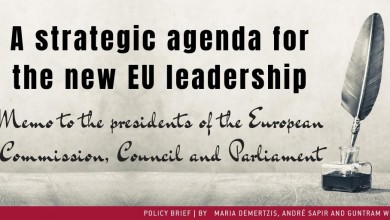Oped published in Handelsblatt, Corriere della Serra, Helsingin, Bruegel and others.
Two and a half years into Russia’s war of aggression against Ukraine, the question of armaments and the speed of military procurement and production is gaining in importance – and Europe will have to get more involved. Europe, especially Germany, has neglected its security for decades and the situation is improving only very slowly. For example, it will take many decades for Germany to build back up to the number of artillery systems it had just 20 years ago. Meanwhile, Russian military production has increased massively, to the point where it can produce the equivalent of the entire German stock of major weapon systems in less than a year.
Despite the alarming numbers, many, including in the security community, believe that Europe can ultimately rely on the United States for defence. The argument is that Europe does not need to invest much and can do so selectively, since many military services, such as securing air superiority, are ultimately provided by the US.
There is also extreme scepticism about a European approach to defence procurement. Why think about Europe as long as countries have domestic defence industries and for additional needs can buy American products? These assumptions are not surprising: Europe’s dependence on the US has been advantageous and has served European interests well. Furthermore, EU defence procurement initiatives have not been very successful.
However, it is time to overcome the excessive dependence on the US for both the provision of security and the supply of major weapons systems. The European political system must leave its comfort zone for three reasons.
First, regardless of the November presidential election result, the US will have to focus more on other world regions. Second, policymakers must face the fact that the US is not only deeply divided, but is also showing signs of political fragility and may be facing a severe constitutional crisis. Third, the US production capacity for military goods is limited as it delivers weapons systems to allies in Asia, the Middle East and Ukraine. Systems such as the HIMARS rocket launcher will be in high demand, for example in connection with Taiwan.
At this critical moment, governments of key European countries should thus develop and promote a European defence strategy. With growing defence budgets, it should be easier to move beyond national interests in the defence sector. Previous European defence procurement initiatives were hampered by excessive national protectionism. Countries justified this citing national security interests but it was often local jobs that drove it. However, rising defence budgets now mean that more jobs are being created in the defence sector and the situation of European defence companies has also improved considerably since 2022. There is therefore scope for action against protectionism motivated by local industrial policy interests.
A European armaments production strategy should aim for higher production volumes at lower unit costs. With tight public budgets, high production costs are difficult to justify. Greater efficiency is only possible through greater industrialisation of production and greater specialisation of production across Europe.
The European strategy must therefore find ways to allow market forces and companies to decide on the best ways to produce cost-effectively. Instead of each country buying small quantities at high cost from local manufacturers, Europe must find ways to exploit economies of scale by integrating its markets. Security concerns must be taken into account, but this should be underpinned by clear justifications.
A European debt fund would ensure a rapid increase in demand. It could be used to strengthen the German air defence European Sky Shield Initiative, which would lead to more joint procurement and economies of scale. It would strengthen joint procurement, accelerate the development of defence capabilities and support market integration. It is time for decision-makers to consider bold steps to strengthen European defence. A stronger Europe is essential for the transatlantic alliance. The complacent view that business as usual will continue can no longer be justified.


